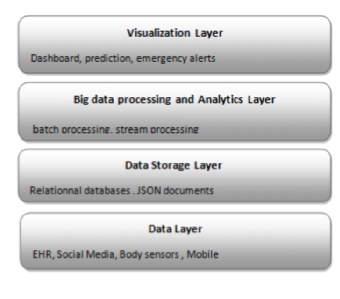Difference between revisions of "Template:Article of the week"
Shawndouglas (talk | contribs) (Updated article of the week text.) |
Shawndouglas (talk | contribs) (Updated article of the week text.) |
||
| Line 1: | Line 1: | ||
'''"[[Journal: | <div style="float: left; margin: 0.5em 0.9em 0.4em 0em;">[[File:Fig2 Elaboudi AdvInBioinfo2018 2018.png|240px]]</div> | ||
'''"[[Journal:Big data management for healthcare systems: Architecture, requirements, and implementation|Big data management for healthcare systems: Architecture, requirements, and implementation]]"''' | |||
The growing amount of data in the healthcare industry has made inevitable the adoption of big data techniques in order to improve the quality of healthcare delivery. Despite the integration of big data processing approaches and platforms in existing [[Information management|data management]] architectures for healthcare systems, these architectures face difficulties in preventing emergency cases. The main contribution of this paper is proposing an extensible big data architecture based on both stream computing and batch computing in order to enhance further the reliability of healthcare systems by generating real-time alerts and making accurate predictions on patient health condition. Based on the proposed architecture, a prototype implementation has been built for healthcare systems in order to generate real-time alerts. The suggested prototype is based on Spark and MongoDB tools. ('''[[Journal:Big data management for healthcare systems: Architecture, requirements, and implementation|Full article...]]''')<br /> | |||
<br /> | <br /> | ||
''Recently featured'': | ''Recently featured'': | ||
: ▪ [[Journal:Support Your Data: A research data management guide for researchers|Support Your Data: A research data management guide for researchers]] | |||
: ▪ [[Journal:CÆLIS: Software for assimilation, management, and processing data of an atmospheric measurement network|CÆLIS: Software for assimilation, management, and processing data of an atmospheric measurement network]] | : ▪ [[Journal:CÆLIS: Software for assimilation, management, and processing data of an atmospheric measurement network|CÆLIS: Software for assimilation, management, and processing data of an atmospheric measurement network]] | ||
: ▪ [[Journal:How could the ethical management of health data in the medical field inform police use of DNA?|How could the ethical management of health data in the medical field inform police use of DNA?]] | : ▪ [[Journal:How could the ethical management of health data in the medical field inform police use of DNA?|How could the ethical management of health data in the medical field inform police use of DNA?]] | ||
Revision as of 18:25, 3 December 2018
"Big data management for healthcare systems: Architecture, requirements, and implementation"
The growing amount of data in the healthcare industry has made inevitable the adoption of big data techniques in order to improve the quality of healthcare delivery. Despite the integration of big data processing approaches and platforms in existing data management architectures for healthcare systems, these architectures face difficulties in preventing emergency cases. The main contribution of this paper is proposing an extensible big data architecture based on both stream computing and batch computing in order to enhance further the reliability of healthcare systems by generating real-time alerts and making accurate predictions on patient health condition. Based on the proposed architecture, a prototype implementation has been built for healthcare systems in order to generate real-time alerts. The suggested prototype is based on Spark and MongoDB tools. (Full article...)
Recently featured:










